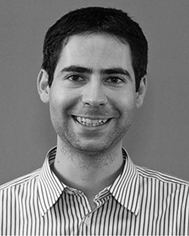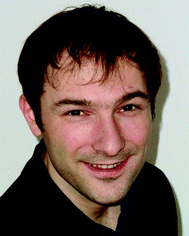DOI: 10.1039/C1LC90139G
(Profile)
Lab Chip, 2012, 12, 419-421
Contributors to the 10th Anniversary Germany issue
Jean-Christophe Baret
Jean-Christophe Baret was born in France, in 1979. In 2002, he received his engineering degree from ESPCI and his Masters in Fluid Physics from the Université Pierre et Marie Curie (Paris, France). In 2005, he received his PhD from the University of Twente (the Netherlands) on electrowetting and electrocapillarity. During his post-doc at ISIS (Université de Strasbourg and CNRS, France), he developed droplet-based microfluidic tools for biotechnology applications. Since 2010, he has been a Max-Planck Research Group Leader at the MPI in Goettingen, working on dynamics and self-organization. His research interests are microfluidics for the study of soft matter and liquid interfaces.
Detlev Belder
Detlev Belder (b. 1964 in Celle) studied chemistry at the Universities of Clausthal and Marburg. He obtained his PhD in analytical chemistry in 1994. After a post-doc stay at SmithKline-Beecham in England, he was the head of the Separation Science Department at the Max-Planck-Institut für Kohlenforschung (Mülheim) for 11 years. In 2006, he joined the University of Regensburg as an Associate Professor in Analytical Chemistry. In 2007, he moved to the University of Leipzig as a Chair in Analytical Chemistry. Belders current main research interest is the development of microfluidic lab-on-a-chip devices with a focus on separation science, mass spectrometry, surface chemistry, catalyst screening, fluorescence detection and microfabrication.
Frank F. Bier
Frank F. Bier studied physics and mathematics at the Universities of Muenster and Heidelberg, Germany and received his PhD in physics in 1989. In 1998, he received the “habilitation” (venia legendi) for Biochemistry at the University of Potsdam. In 2000, he became head of the Department of Molecular Bioanalytics of the Fraunhofer Institute for Biomedical Engineering IBMT. In 2003, he was appointed Full Professor “Chair of Applied Bioelectronics and Biochip Technologies” at the University of Potsdam. Since 2006, he has been the Director of the Branch Potsdam of the IBMT. His current interests are biosensors, molecular in vitro diagnostics, nanobiotechnology and the development of cell-free biosynthesis. Frank Bier coordinated the project ‘Fraunhofer ivD-platform’ and promotes its commercialization.
Jialan Cao
Jialan Cao was born in 1979 in Shanghai, China. She was educated in electrical and information engineering at the Technical University of Ilmenau, Germany. After graduation, she became active as a scientific assistant at the Institute of Chemistry and Biotechnology, Department of Physical Chemistry and Microreaction Technology. At the same institute she qualified as a PhD student starting in 2010 till today. Her research interests are focused on the application of a microfluid-segment technique for toxicological analysis of miniaturized environments. This method allows the analysis of single substances, combined substances and complex toxicological mixtures using different model organisms.
Oliver Gruschke
Oliver Gruschke received a Diplom-Ingenieur degree (Dipl.-Ing.) in microsystems engineering from the University of Freiburg in Germany in 2008, in cooperation with the University of Michigan, USA. Currently, he is pursuing a PhD degree at the Lab. of Simulation, Department of Microsystems Engineering (IMTEK), University of Freiburg. His research interests include the development of magnetic resonance hardware with a focus on transmit/receive systems for small samples in the lower millimetre region, which are based on low cost microelectromechanical systems (MEMS) technology.
Steffen Hardt
Steffen Hardt is the head of the Institute for Nano- and Microfluidics at the Center of Smart Interfaces/TU Darmstadt. He obtained his PhD in theoretical physics, after which he accepted a position at the Institut für Mikrotechnik Mainz (IMM) where the focus of his research shifted to microtechnology and microfluidics. At IMM he gained experience in applied research and development, designing micromixers, microreactors, and lab-on-a-chip systems. After appointments at TU Darmstadt and Universität Hannover, he returned to Darmstadt in 2009. He is especially interested in creating novel applications, for example in the field of lab-on-a-chip technology, from insights gained in fundamental science. His current research interests include separation processes at liquid/liquid interfaces, transport phenomena at superhydrophobic surfaces, isotachophoresis, gas dynamics in nanochannels, and optofluidics.
Michael Kirschbaum
Michael Kirschbaum (born 1978) studied biology at the University of Tuebingen, Germany, with a special focus on neurobiology and physics. After having graduated in 2005, he joined the group Lab-On-Chip Technologies at the Fraunhofer Institute for Biomedical Engineering (IBMT) in Potsdam, Germany, where he finished his PhD in 2009. Since then, he has been leading the group Cell Assay Development there. His main research interests are in single-cell manipulation and analysis as well as in microfluidics.
J. Michael Köhler
J. Michael Köhler (born 1956) studied Chemistry at the Universities of Halle (Salle) and Jena (Germany). After a dissertation on electrochemical effects in microfabrication (1986), he lead projects on submicron photolithography at the Institute of Physical Technology in Jena. During a research stay in 1991 in Dortmund (MPG) he dealt with chemical waves in gels. He got habilitation for General and Physical Chemistry at the University of Jena in 1992. In the same year, he became the head of the Microfabrication Department; and in 1994, the head of the Microsystem Department at the Institute of Physical High Technology in Jena. Since 2001, he has been a Full Professor for Physical Chemistry and Micro Reaction Technology at the Technical University of Ilmenau. His research activities are focused on the development of microreactors and the application of microfluidics in cell screening, nanomaterial synthesis and in nanotechnology.
Soeren Schumacher
Soeren Schumacher studied chemical engineering at the “Europa Fachhochschule Fresenius” in Idstein, Germany and received his PhD in physical chemistry from the University of Potsdam in 2011. His major scientific interest is in the interdisciplinary development of novel diagnostic solutions. The focus of his current activities is on the merging of life sciences and technology in applied research with a strong emphasis on “technology transfer”. He is responsible for the business development and market strategy of the Fraunhofer ivD-platform.
G. A. Urban
G. A. Urban received his Diploma for technical physics at the Technical University Vienna, following which he was a research assistant at the Neurosurgical Department, University Hospital Vienna. In 1985, he received his PhD in electrical engineering at the TU Vienna. He was a post-doc at the Neurophysiological Department of the University Muenster, Germany. He was co-founder of the company OSC in Cleveland and Vienna. In 1990, he became Scientific Director of the Ludwig Boltzmann Institut for Biomedical Microengineering. In 1994, he received the Venia Legendi for Sensor Technology. In 1997, he became Full Professor of Sensors at the Institute for Microsystems Technology at the Albert Ludwig University Freiburg/Germany. He is an external member of the Austrian Academy of Sciences and series editor of the Springer series “Bio- and Chemosensors”. His main interest focus is on the research and development of microanalytic devices, integrating microfluidic with micro- and nanosensor applications. He has published more than 100 papers, 15 book chapters and 57 patents and received four awards.
Martina Viefhues
Martina Viefhues received her B.Sc. (2007) and Master degree (2009) from the Department of Physics at Bielefeld University (Germany). Her research was focused on developing a microfluidic device for continuous DNA separation and analysis by dielectrophoresis under the supervision of Dr Jan Regtmeier and Prof. Dario Anselmetti. Currently, she is a PhD student at Bielefeld University, working on developing continuous flow applications towards functional integration into a micro total analysis system (μ-TAS) in the Experimental Biophysics and Applied Nanoscience group.
| This journal is © The Royal Society of Chemistry 2012 |











